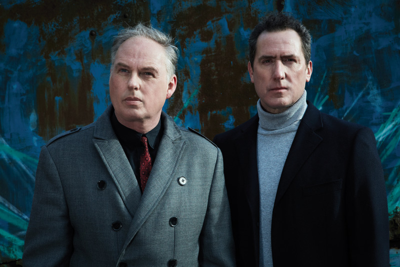
Orchestral Manoeuvres in the Dark. With smooth European elegance, that name promised a musical and visual ethos that remained constant during times of fragmentation, triumph and tragedy. OMD had hard-won accolades during the early days of the British synthpop invasion, with a sound that was equally experimental and accessible. Then the group was elevated to global superstardom thanks to the ears of John Hughes and Pretty in Pink music supervisor David Anderle, who sent "If You Leave" into the annals of prom-ballad history in 1986. So when grunge ruled the alternative airwaves, bifurcation led to further innovation and dance club success for OMD. 1993's Liberator was a superb example of cross-pollinating rave culture with more traditional songcraft, just as their Chicago house megamix "Brides of Frankenstein" fruitfully introduced Steve "Silk" Hurley and Mike "Hitman" Wilson to the synthpop crowd in 1988. The band called it quits in 1996, beginning a decade-long hiatus that ended when frontman Andy McCluskey reunited with bandmates Paul Humphreys, Martin Cooper and Malcolm Holmes for an out-of-the-blue German television appearance.
Evolution is a necessity in the protean world of popular music. Sometimes all it takes is a moment like the synth-piano hook at the beginning of OMD's 1981 single "Souvenir" — a sequence that feels like the spine from which the most deeply romantic tendencies of New Wave and synthpop sprang like a Greek deity. Take a moment and listen to "Souvenir," then follow it up with the song's new-millennium progeny, TV on the Radio's "Family Tree." Is it just something about that chord sequence? Or some combination of notes that triggers a Pavlovian response in human beings and the more evolved birds? It's a whirlpool that, rather than drowning you, holds you up. If OMD had never recorded anything else after "Souvenir," they'd still be remembered. Thankfully, though, they were just getting started.
This is a good place to go on for a bit about 1981's Architecture & Morality and 1983's Dazzle Ships. Those albums are gorgeous achievements that feel passionately alive and vibrant some three-and-a-half decades on. They are the musical equivalent of the adage from Fritz Lang's Metropolis, about the heart acting as mediator between the hands and the mind; the organic and the artificial given parity, each expressing what the other could not. That is how overwhelming and resonant those two albums are for this scribe.
Yes, "If You Leave" is a classic. "Enola Gay," while in rather questionable taste, remains one of the most enduring breakup songs of the '80s — the '80s being a time when any historical tragedy could become the basis for a pop song, e.g. Paul Hardcastle's "19" (Vietnam), Sandra's "Hiroshima" and Danielle Deneuve's "The Rising Sun" (World War II). OMD's 1988 single "Dreaming" has one of the most perfect choruses that decade ever produced. 1991's "Speed of Light" and "Call My Name" are among the best Eurodisco tracks of the early '90s. Truthfully, if they had done nothing else in the '90s other than "Dream of Me," OMD would still have introduced a new generation to the indescribable majesty of Barry White.
That they opened for Depeche Mode on legendary 1988 Music for the Masses Tour (including a famously underattended stop at Starwood Amphitheatre) fits in the grand scheme of the universe; when OMD plays Nashville, it's your moral imperative to be there. They'll be playing as part of one of the more interesting bills in the city's recent history, sandwiched between Canadian masters of the pop idiom Barenaked Ladies and British songwriter and synthesist Howard Jones. All three acts had hits in their respective eras, but helped to burnish the reputations of the others when you listen to the songcraft that each excels in.
Pop music is generally regarded as an artform of the moment, designed for maximum saturation and disposability. And yet, when you take in something like Jones' 1983 "New Song," or BNL's 2000 "Pinch Me," or most certainly OMD's 1986 "Forever (Live and Die)," you find these enduring touchstones that still hit like hammers. A great pop song really doesn't reveal its true greatness for at least a decade or so after its time of dominance. And McCluskey and Humphreys (and their various and bandmates) have demonstrated for more than 35 years that their Manoeuvres still shine.
Email music@nashvillescene.com





